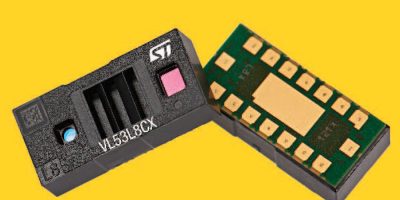ST has announced the latest-generation 8×8 multi-zone time-of-flight (ToF) ranging sensor that delivers a range of improvements including greater ambient-light immunity, lower power consumption, and enhanced optics.
ST’s direct-ToF sensors combine a 940nm vertical cavity surface emitting laser (VCSEL), a multi-zone SPAD (single-photon avalanche diode) detector array, and an optical system comprising filters and diffractive optical elements (DOE) in an all-in-one module that outperforms conventional micro lenses typically used with similar alternative sensors. The sensor projects a wide square field of view of 45° x 45° (65° diagonal) and receives reflected light to calculate the distance of objects up to 400cm away, across 64 independent zones, and up to 30 captures per second.
The new VL53L8CX boosts ranging performance with a new-generation VCSEL and advanced silicon-based meta-optics. Compared with the current VL53L5CX, the enhancements increase immunity to interference from ambient light, extending the sensor’s maximum range in daylight from 170cm to 285cm and reducing power consumption from 4.5mW to 1.6mW in low-power mode.
ST released the first multi-zone time-of-flight sensor with the VL53L5CX in 2021. By increasing performance, the new VL53L8CX now further extends the advantages of these sensors over alternatives with conventional optics, which have fewer native zones and lose sensitivity in the outer areas. Thanks to its true 8×8 multi-zone sensing, the VL53L8CX ensures uniform sensitivity and accurate ranging throughout the field of view, with superior range in ambient light.
When used for system activation and human presence detection, the VL53L8CX’s greater ambient-light immunity enables equipment to respond more consistently and quickly. As part of ST’s STGesture platform that also includes the STSW-IMG035 turnkey gesture-recognition software and Gesture EVK development tool, the new sensor delivers the precision needed for repeatable gesture-based interaction. In addition to motion gesture recognition, hand posture recognition is also possible leveraging the latest AI models available in the STM32ai-modelzoo on GitHub.
Moreover, the VL53L8CX provides increased accuracy for monitoring the contents of bins, containers, silos, and tanks, including liquid-level monitoring, in industrial bulk storage and warehousing. The superior accuracy can also enhance the performance of drinks machines such as coffee makers and beverage dispensers.
Mobile robots including autonomous vacuum cleaners can leverage the VL53L8CX to improve guidance capabilities like floor sensing, small object detection, collision avoidance, and cliff detection. Also, the synchronisation pin enables projectors and cameras to benefit from coordinated autofocus. There is also a motion indicator, an auto-stop feature that allows real-time actions, and the sensor is immune to cover-glass crosstalk beyond 60cm. Now supporting SPI connectivity, in addition to the 1MHz I2C interface, the new sensor handles host data transfers at up to 3MHz.
Designers can quickly evaluate the VL53L8CX and jump-start their projects taking advantage of the supporting ecosystem that includes the X-NUCLEO-53L8A1 expansion board and SATEL-VL53L8 breakout boards. The P-NUCLEO-53L8A1 pack is also available, which contains a STM32F401 Nucleo microcontroller board and X-NUCLEO-53L8A1 expansion board ready to power up and start exploring.







